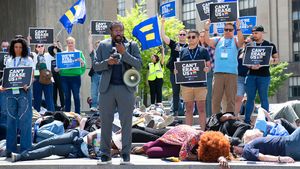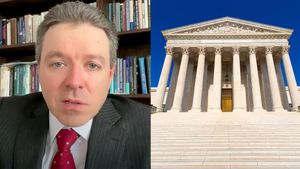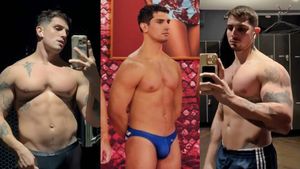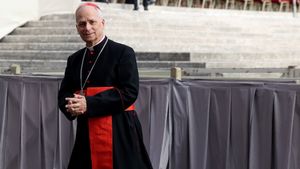Some years ago, I was taking a run without a shirt on a warm fall day when I happened upon Barry Diller and his wife, Diane von Furstenberg, out for a walk. Diller and I immediately locked eyes, and then his eyes went up and down at me.
I had a good laugh after I passed him. And I wasn’t the only one who had a Barry Diller googly-eye story. I’ve heard several stories, and even one of my colleagues here at The Advocate had one.
I’ve lived in New York City over 30 years, and when Diller revealed this week that he was gay in a piece he wrote for New York Magazine, most everyone just shrugged. It was an open “secret” that he liked men. The bigger surprise, perhaps, was that he even felt the need to address the issue.
But the issue he was really addressing was less about him being gay, and more about his long-time marriage to fashion designer von Furstenberg. Because there’s still something powerful about the quiet confirmation as it relates to marriages like theirs that at one time were actually quite commonplace.
Diller’s been married to the iconic von Furstenberg since 2001, but they've been together in various forms since the '70s. His revelation isn’t about being outed or scandalized. He was simply stating a truth about who he is, and perhaps more important, who he has always been.
In our current world of TikTok “soft launches,” Reddit confessionals, and open dialogue about sexual identity disclosures, it can be easy to forget that the world Diller and von Furstenberg came of age in was different. It was an era that was pre-Grindr. Pre-Ellen. Pre-safety, pre-sincerity, pre-authenticity, pre-closet, and pre-beard.
Some say they were simpler times, since we’re now hounded by technology, but in reality, those times weren’t so simple. They were more about repression, and that’s difficult, but excruciatingly doable.
Back in the day, gay men marrying women wasn’t a contradiction. It was a strategy. Some to survive, others to be in a socially acceptable arrangement. Or, a lavender curtain drawn over a very complicated stage.
Keep up with the latest in LGBTQ+ news and politics. Sign up for The Advocate's email newsletter.
These marriages happened in Hollywood, high society, and nearly every middle-class suburb in America — think Dennis Quaid and Julianne Moore in Far From Heaven. And for others, it was an open secret, like Diller’s, that, yes I'm a gay man, but I happen to be married to a woman, and what I do on my own time is no one else’s business.
Additionally, if you saw Bradley Cooper’s portrayal of composer Leonard Bernstein, in the film Maestro, you know what I’m talking about. In the film, although he’s married to a woman, Bernstein can’t control his urges around handsome men, and he is shameless about it.
About 30 years ago, while I was on vacation with my first boyfriend, we happened upon a married M-F couple. It was clear that the guy was queer, and after a few drinks, they opened up. “He can watch porn with men, but he cannot have sex with them, only me,” she said, or words to that effect.
Years later, I learned that while the wife and I got wasted in a bar, her husband and my then-partner snuck off and hooked up. So much for a rule that’s virtually impossible to follow if your sexual desires lie with men, and lying with a man.
It was common knowledge back in the day that many women married queer men for a variety of reasons. For example, Judy Garland’s husband, Vincente Minnelli, was gay. Their daughter, Liza, married Peter Allen, who was also gay. Rock Hudson had a “secretary” wife in Phyllis Gates. Actor Anthony Perkins was famously married to actress, model, and photographer Berry Berenson for 19 years until he died of AIDS complications.
And over in the other circles where Diller and von Furstenberg orbited, those of elite media, politics, fashion, and finance, these unions weren’t shocking. They were sometimes even celebrated or kept hush-hush. Think Jackie O’s sister Lee Radziwill and Herbert Ross. Composer Cole Porter and socialite Linda Lee Thomas were married for 35 years. Another denizen of Upper East Side society, Kitty Carlisle Hart was married to composer Moss Hart, long rumored to be gay. Even Oscar Wilde had his Constance.
These marriages were often rooted in genuine companionship, mutual admiration, artistic alignment, or shared ambition. Sometimes they were protective covers, and at other times, just deeply unconventional romances that didn’t quite fit in a binary box.
But we’re not in that era anymore.
Today, we live in a society where queer men still marry women, but not usually under the same terms the socialites wed. These unions today may emerge out of religious pressure, internalized shame, geographic isolation, or, less nobly, career convenience. But many of the conditions that once demanded secrecy, criminalization, ostracization, and career annihilation have lessened. Not disappeared, but certainly shifted.
Marriage equality changed a lot. So did dating apps and hookup culture. So did visibility. The iPhone made the closet a hard place to stay hidden, and then of course the buzz of social media makes it hard for anyone to be discreet. Additionally, relationships in our culture are changing. Gen Z is now making polyamory Pinterest boards with inspirational quotes about “chosen entanglements.”
The marriage Diller and von Furstenberg had was a long, elegant, respectful, and deeply intimate partnership between a gay man and a fabulous woman. This is no longer required in the way it once was. It doesn’t make it any less real. It just makes it rarer.
That’s the nuance here. Diller isn’t revealing he “never loved” von Furstenberg. Quite the opposite. Over the years, they described their marriage mostly glowingly. They chose each other, and they continued choosing each other across decades, careers, and changing cultural tides.
And that’s something we might need more language for. In our rush to celebrate out and proud identities, and we should, we sometimes forget the twist, turns, and contortions of human intimacy. Diller’s marriage is not a lie. It’s a testament to how layered and custom-built relationships can be, especially among people navigating hostile environments for most of their lives.
That’s why, when I have been asked over the years about rumored gay men married to women (to my straight friends, I should have the inside scoop because I’m gay), I take a page from Pope Francis, saying, “Who am I to judge?”
Still, Diller’s coming out matters for visibility because older generations of gay and queer men deserve to be fully seen, and not just posthumously after they die. Diller is 84, and you can bet that there are still men in their 70s and 80s who haven’t come out because of fear, and the lingering stigma they suppose about it. And it matters because younger people benefit from hearing that coming out isn’t a one-size-fits-all, one-time-only event. It can happen anytime.
Conversely, there are still a surprising number of men in Hollywood, politics, and business, many of them married to women, who continue to live on the down low. Some out of shame. Some out of habit. Some because their industry has told them it’s the only way to keep power. And some because, frankly, they like the arrangement.
However, the days of needing a woman to make a man’s queerness socially survivable are mostly over. Society doesn’t demand that kind of cover anymore. And the next generation, if gay men marry women, the couples will do so with open eyes, open profiles of their social platforms, and open conversations on an online forum.
At least to me, Diller’s news isn’t shocking. But it’s the final chapter of a generational saga. Maybe von Furstenberg said it best: “Barry is the love of my life.” That love, in all its contradictions, defies every category.
Good for them! Live and let live, and who am I to judge?
Voices is dedicated to featuring a wide range of inspiring personal stories and impactful opinions from the LGBTQ+ community and its allies. Visit Advocate.com/submit to learn more about submission guidelines. Views expressed in Voices stories are those of the guest writers, columnists, and editors, and do not directly represent the views of The Advocate or our parent company, equalpride.














































































